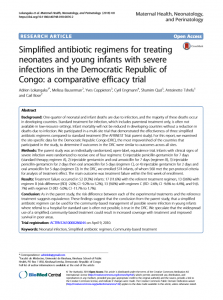
Abstract
Background
One-quarter of neonatal and infant deaths are due to infection, and the majority of these deaths occur in developing countries. Standard treatment for infection, which includes parenteral treatment only, is often not available in low-resource settings. Infant mortality will not be reduced in developing countries without a reduction in deaths due to infection. We participated in a multi-site trial that demonstrated the effectiveness of three simplified antibiotic regimens compared to standard treatment (The AFRINEST Trial: parent study). For this report, we examined the site-specific data for the Democratic Republic Congo (DRC), the most impoverished of the countries that participated in the study, to determine if outcomes in the DRC were similar to outcomes across all sites.
Methods
The parent study was an individually randomized, open-label, equivalence trial. Infants with clinical signs of severe infection were randomized to receive one of four regimens: 1) injectable penicillin-gentamicin for 7 days (standard therapy; regimen A), 2) injectable gentamicin and oral amoxicillin for 7 days (regimen B), 3) injectable penicillin-gentamicin for 2 days then oral amoxicillin for 5 days (regimen C), or 4) injectable gentamicin for 2 days and oral amoxicillin for 5 days (regimen D). In the DRC, we enrolled 574 infants, of whom 560 met the per-protocol criteria for analysis of treatment effect. The main outcome was treatment failure within the first week of enrollment.
Results
Treatment failure occurred in 52 (9.3%) infants: 17 (11.6%) with the referent treatment regimen, 13 (9.6%) with regimen B (risk difference [RD] -2.0%; CI -9.2% to 5.2%), 13 (9.0%) with regimen C (RD -2.6%; CI -9.6% to 4.4%), and 9 (6.7%) with regimen D (RD -5.0%; CI -11.7% to 1.7%).
Conclusion
As in the parent study, the risk difference between each of the experimental treatments and the reference treatment suggests equivalence. These findings suggest that the conclusion from the parent study, that a simplified antibiotic regimen can be used for the community-based management of possible severe infection in young infants where referral to a hospital for standard care is often not possible, is true in the DRC. We speculate that the widespread use of a simplified, community-based treatment could result in increased coverage with treatment and improved survival in poor areas.
Access the original article and any supplementary material here.